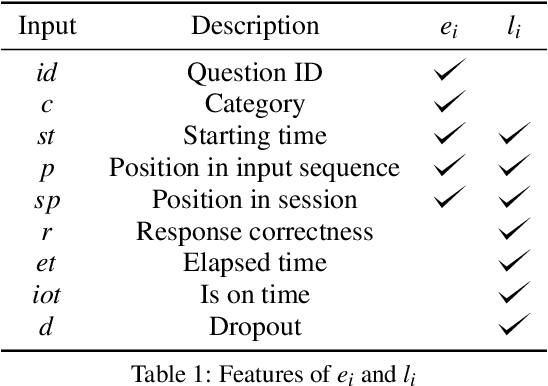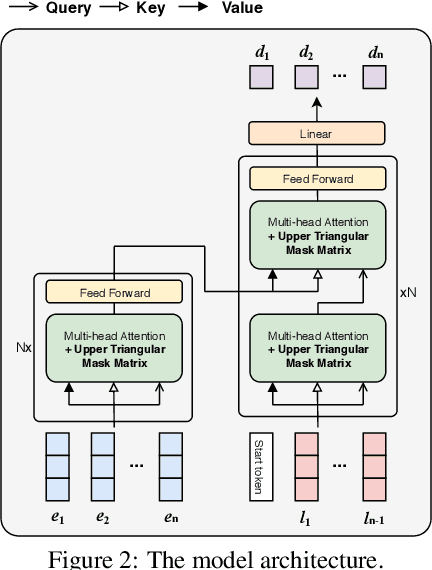Jinhwan Lee
Prescribing Deep Attentive Score Prediction Attracts Improved Student Engagement
May 19, 2020



Abstract:Intelligent Tutoring Systems (ITSs) have been developed to provide students with personalized learning experiences by adaptively generating learning paths optimized for each individual. Within the vast scope of ITS, score prediction stands out as an area of study that enables students to construct individually realistic goals based on their current position. Via the expected score provided by the ITS, a student can instantaneously compare one's expected score to one's actual score, which directly corresponds to the reliability that the ITS can instill. In other words, refining the precision of predicted scores strictly correlates to the level of confidence that a student may have with an ITS, which will evidently ensue improved student engagement. However, previous studies have solely concentrated on improving the performance of a prediction model, largely lacking focus on the benefits generated by its practical application. In this paper, we demonstrate that the accuracy of the score prediction model deployed in a real-world setting significantly impacts user engagement by providing empirical evidence. To that end, we apply a state-of-the-art deep attentive neural network-based score prediction model to Santa, a multi-platform English ITS with approximately 780K users in South Korea that exclusively focuses on the TOEIC (Test of English for International Communications) standardized examinations. We run a controlled A/B test on the ITS with two models, respectively based on collaborative filtering and deep attentive neural networks, to verify whether the more accurate model engenders any student engagement. The results conclude that the attentive model not only induces high student morale (e.g. higher diagnostic test completion ratio, number of questions answered, etc.) but also encourages active engagement (e.g. higher purchase rate, improved total profit, etc.) on Santa.
Deep Attentive Study Session Dropout Prediction in Mobile Learning Environment
Feb 14, 2020



Abstract:Student dropout prediction provides an opportunity to improve student engagement, which maximizes the overall effectiveness of learning experiences. However, researches on student dropout were mainly conducted on school dropout or course dropout, and study session dropout in a mobile learning environment has not been considered thoroughly. In this paper, we investigate the study session dropout prediction problem in a mobile learning environment. First, we define the concept of the study session, study session dropout and study session dropout prediction task in a mobile learning environment. Based on the definitions, we propose a novel Transformer based model for predicting study session dropout, DAS: Deep Attentive Study Session Dropout Prediction in Mobile Learning Environment. DAS has an encoder-decoder structure which is composed of stacked multi-head attention and point-wise feed-forward networks. The deep attentive computations in DAS are capable of capturing complex relations among dynamic student interactions. To the best of our knowledge, this is the first attempt to investigate study session dropout in a mobile learning environment. Empirical evaluations on a large-scale dataset show that DAS achieves the best performance with a significant improvement in area under the receiver operating characteristic curve compared to baseline models.
 Add to Chrome
Add to Chrome Add to Firefox
Add to Firefox Add to Edge
Add to Edge